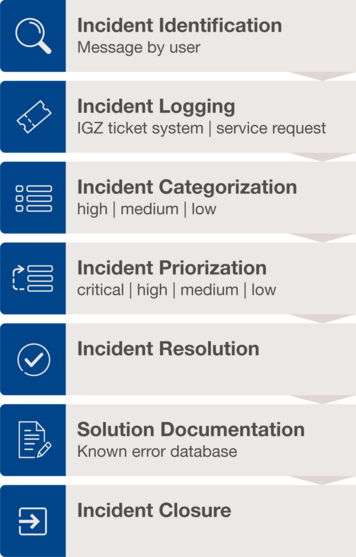Incident Management Systematic and efficient troubleshooting

Service Level Agreements (SLA) help maintain plant availability and document the agreed quality of the services to be provided within a defined time window. To be able to react quickly and accurately to individual customer requirements in the event of an urgent incident, we offer our IGZ Customer Service (ICS), a corresponding incident management system.
Incident Management is the "flagship" of our core ICS services and enables professional 24/7 hotline support in conjunction with a high level of technical integration (SAP, PLC, mechanics).
The decisive advantage over "classic" service level agreements is that any error messages are received directly by specialists without any loss of time or friction (without any "routing").
You receive a professional hotline for all SAP modules in your digital supply chain:
Thanks to our technical expertise in the fields of PLC and mechanics, you receive one (1) hotline to ensure safe operation of your logistics and production plant – with clearly defined response times and tailored to the needs of your plant.
Incident Management is a service management process that comprises part of the ITIL methodology (IT Infrastructure Library). The primary goal is to eliminate any faults that occur within the shortest possible time together with the customer. The focus is always on a first-contact resolution that can be achieved as directly as possible at the first approach. The availability of experienced service resources ensures that incidents are assigned directly to the responsible support team/customer manager. This allows IGZ Service Consultants to deal with any malfunctions and problems that may result in business management impairments in the most ad hoc manner possible. ITIL defines these malfunctions as unplanned disruptions to IT services and/or quality-reducing restrictions. Therefore the incident itself is the focus of consideration, and not its cause (see also Problem Management).
Systematic, fast and efficient resolution of incidents

Malfunctions can result from a variety of causes (e.g. operating errors, data inconsistencies, application errors, network problems, etc.). If there are direct effects on warehouse and/or production control, then rapid action is required.
The decisive and common goal here is usually to restore the application as quickly as possible or at least to create a suitable workaround. This objective distinguishes Incident Management from Problem Management or what is known as "Request Management", which fulfils specific requests in the form of consulting services.
The proven IGZ Service Methodology in Incident Management is based on the following (simplified) flow chart: First, a ticket is created by the hotline and first identified. The ticket is subsequently categorised and prioritised (according to the rules of the jointly agreed service level agreement); it is then immediately processed. Once ticket processing has been completed, the implemented measures are documented.
The decisive advantage over traditional services is that our IGZ Customer Service (ICS) receives incident reports directly without any detours, i.e. without any loss of time or friction (no call centre or similar).
Our service specialists work with checklists, which enable clear, objective category and priority allocation, which in turn enables the quick pre-classification of incidents that meet the actual need in terms of extent and urgency.
Secure methodology for increasing the first-contact resolution rate
Incidents can occur at the software level (SAP, PLC) as well as at the technology level (system technology, hardware, network, etc.). The first step of professional incident processing requires the incident to be recorded as completely as possible – and if possible without any time-consuming demand queues.
IGZ Service Consultants are supported by appropriate service tools for categorisation and prioritisation. If incidents cannot be resolved immediately in the first step, clearly-defined escalation rules agreed with our customers come into play. These simplify the cooperation with the 2nd and 3rd level service teams to ensure that a suitable joint solution can be found as quickly as possible.
As soon as this has been found and finally implemented, this is documented in addition to the preceding processes. Traceability and consistent transparency form the basis of embedded knowledge management for our customers.
The special benefit here is that the collected and shared experience simplifies and further accelerates the solution of future service tickets. This means that the first-contact resolution rate can be successively increased, and if possible already at the 1st level.
Keyfacts for clearly structured incident management

When managing incidents, keyfacts such as the number of incidents, the solution to such incidents and the average reaction and resolution time are also essential.
Corresponding evaluation of these keyfacts across categories, priorities and over time provides valuable information on the current level of incident management. At the same time, this allows statements to be made about the overall quality of the IT infrastructure in question.
IGZ offers (depending on the agreement) corresponding service reports, which can be sent at regular intervals (e.g. monthly) and discussed together.
Incident Management vs. Problem Management

By definition, Incident Management focuses on incidents that have a negative impact on the quality of a service. The key objective is to return this service to the level agreed in the service level agreement (SLA) in the shortest possible time.
Negative effects on business processes must be minimised and customer satisfaction must be restored immediately. In contrast, Problem Management, which also forms part of ITIL, pursues the approach of preventing incidents from occurring in the first place. The causes of problems are investigated, localised and eliminated using suitable measures.
Against this backdrop, Problem Management sees itself as a primarily preventive catalogue of measures.


